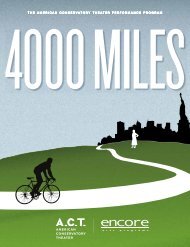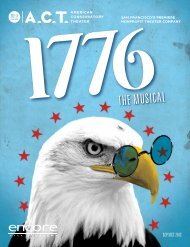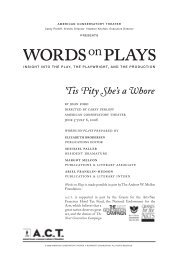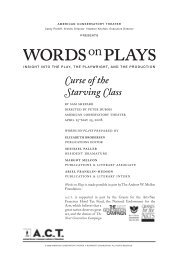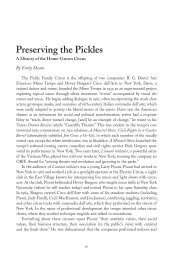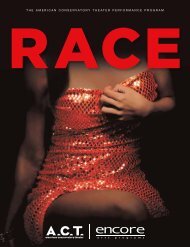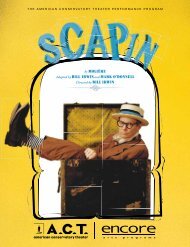WHO'S WHO - American Conservatory Theater
WHO'S WHO - American Conservatory Theater
WHO'S WHO - American Conservatory Theater
You also want an ePaper? Increase the reach of your titles
YUMPU automatically turns print PDFs into web optimized ePapers that Google loves.
© BETTMANN/CORBIS<br />
A BRIEF BIOGRAPHY OF NIKOLAI GOGOL<br />
NIKOLAI VASIL’EVICH GOGOL was born on March 19,<br />
1809, in the small town of Sorochintsy in the Mirgorod district<br />
of Ukraine (also known then as “Little Russia”). The first<br />
surviving child of<br />
Maria Ivanovna<br />
and Vasily<br />
Afanas’ evich<br />
Gogol-Ianovsky,<br />
landowners of<br />
modest means,<br />
young Nikolai<br />
was the darling<br />
of the Gogol-<br />
Ianovsky family.<br />
The conditions<br />
of his childhood<br />
would later<br />
resound in his<br />
writing. His<br />
mother instilled<br />
in him colorful<br />
NIKOLAI GOGOL, 1841<br />
beliefs about<br />
heaven and hell;<br />
his father, an educated man who wrote Ukrainian folk comedies,<br />
showed Gogol the beauty of the surrounding countryside and the<br />
humor of its inhabitants; Gogol’s paternal grandmother fi lled<br />
his mind with Cossack legends, ancient songs, and terrifying<br />
folk tales.<br />
In the spring of 1821 Gogol arrived at the High School for<br />
Advanced Study in Nezhin. The teachers and other students did not<br />
warm quickly to Gogol, whose physical repulsiveness exacerbated<br />
his social ineptitude. The other boys thought the mottled skin of<br />
Gogol’s pointed face and his unusually long, thin nose gave him<br />
a birdlike appearance. This epithet would be repeated throughout<br />
Gogol’s life. He took little interest in his schoolwork, preferring<br />
instead to invent elaborate fabrications, assign nicknames to<br />
students, and write satirical verses about the teachers. Held at a<br />
distance by Gogol’s insightful mockery, the community at the<br />
Nezhin school called him the “mysterious dwarf.”<br />
In 1825, during Gogol’s fourth year at school, his father died,<br />
leaving 16-year-old Nikolai the male authority in the family.<br />
Bolstered by his new status, Gogol returned to school that August<br />
with renewed vigor. He fi nally made friends among the boys who<br />
shared his growing interest in literature. Among the new talents of<br />
the day, Aleksandr Pushkin especially impressed Gogol. Pushkin’s<br />
work, notably his novel in verse Evgeny Onegin, inspired Gogol<br />
and his fellow students to try their own hands at poetry.<br />
Readings of student poetry gave way to theatrical performances.<br />
In a converted gym Gogol and his boyhood friends performed<br />
works of Russian writers, as well as the Ukrainian comedies of<br />
Gogol’s father. Gogol was in his element onstage. Dressed as a<br />
crotchety old man or a female gossip, he displayed such dramatic<br />
talent and confi dence that many thought Gogol would become an<br />
actor. Any aspirations he had for the stage remained unrealized, but<br />
those who were moved to tears and laughter when Gogol read his<br />
work in progress in Russian drawing rooms testify to the writer’s<br />
great talent for losing himself in his characters.<br />
During his final year at school, Gogol’s thoughts turned<br />
increasingly to St. Petersburg. From his provincial distance Gogol<br />
perceived the Russian capital as a wondrous city of wealth and<br />
opportunity. There, he wrote friends and family, he would make<br />
a name for himself and serve Russia in government service or<br />
law. He arrived in St. Petersburg in December 1828 armed with<br />
letters of introduction that proved rather ineffectual. Gogol was<br />
insulted by the humble positions offered to him, disillusioned by<br />
the mindless workings of the civil bureaucracy, and irritated by<br />
the constraints of his own poverty. He fi nally accepted a post that<br />
paid poorly but demanded little of his time, and, encouraged by<br />
the March 1829 publication of his short lyric “Italiia” (Italy) in<br />
Son of the Fatherland, he devoted himself to writing.<br />
His next effort did not fare so well, however. At his own<br />
expense, Gogol published a poem he had written in school, Hans<br />
Küchelgarten; its failure was so disastrous that he bought back all<br />
the copies and burned them and considered emigrating to the<br />
United States. Instead he embezzled the money his mother had<br />
sent him to pay the mortgage on her farm and fl ed to Germany.<br />
When he ran out of money he returned to St. Petersburg, where<br />
he took another lowly government post. He continued to pursue<br />
his writing career, this time fi nding greater success publishing short<br />
stories replete with the folk and folklore of Ukraine.<br />
Gogol’s fi rst collection of stories, Evenings on a Farm Near<br />
Dikanka, published in two volumes in 1831 and 1832, was a<br />
breakthrough work, demonstrating his skill at mixing the fantastic<br />
and the macabre while distilling something essential about the<br />
Russian character. He became famous overnight, admired by such<br />
members of the Russian literary elite as Pushkin, Vasily Zhukovsky,<br />
Sergei Aksakov, and Vissarion Belinsky. In 1835, he published two<br />
new books: Mirgorod, four stories based on provincial Ukrainian<br />
life, and Arabesques, Petersburg essays and stories, including<br />
“Nevsky Prospect” and “The Diary of a Madman.” In 1836 he<br />
published a satirical story (“The Coach”) in Pushkin’s periodical<br />
The Contemporary, which featured Gogol’s story “The Nose” in<br />
its third issue.<br />
Having acquired a reputation for his short stories, in 1832 Gogol<br />
began work on a play but abandoned it when he realized that as<br />
a satire on bureaucracy it would not pass the censor. Two other<br />
plays, both satires, were begun but not fi nished until 1842. Gogol’s<br />
dramatic masterpiece, Revizor, or The Government Inspector (also<br />
translated as The Inspector General), was produced at the court<br />
theater by special order of the czar in 1836. It was taken by many<br />
The Government Inspector 13



